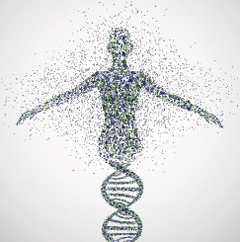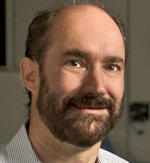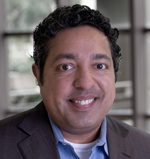June 18, 2013 - By Krista Conger
But gene-patent ruling leaves many questions unanswered

Women with a family history of breast cancer, or with breast cancer themselves, are likely cheering the June 12 ruling by the U.S. Supreme Court, which found that patents granted to Myriad Genetics Inc. for the "breast cancer genes" BRCA1 and BRCA2 are invalid.
As a result, several other companies immediately began to offer analysis of the genes, which significantly increase a person's risk for breast and ovarian cancer, at a much lower price than the $3,000 to $4,000 charged by Myriad.
Clinicians and researchers are also hopeful, if a bit more cautious. Although the ruling may be an ethical and philosophical triumph for those who believe that human genetic information should not be claimed by any corporate entity for profit, it's not likely that patient care will change immediately, according to breast cancer clinicians at the Stanford Cancer Institute. Myriad's experience in the field of BRCA gene testing and interpretation will be difficult to surpass, at least for a while, they said. Over time, however, the ruling should result in a freer research atmosphere that will translate into improvements for patients.
"This is a good thing for patients and for the oncologists who care for them," said Douglas Blayney, MD, the Ann and John Doerr Medical Director of the Stanford Cancer Institute and professor of medicine at the School of Medicine. "It will allow investigators to probe questions and sequences that were formerly off limits. For example, when a researcher discovers abnormalities in BRCA genes in the course of whole-genome sequencing or other types of analysis that we routinely conduct at Stanford, he or she can explore the findings more fully, just like with non-BRCA genes."

Douglas Blayney
Mark Pegram, MD, the Susy Yuan-Huey Hung Professor, agreed. "The Supreme Court got it right this time," said Pegram, a renowned clinician and scholar in breast cancer research and a leader in translational medicine. He directs the institute's breast oncology and molecular therapeutics programs and routinely cares for breast cancer patients at Stanford. "The opinion was very thoughtfully written, and I feel the court's judgment was sound. However, it can't be denied that Myriad has been incredibly empowering for patients and their families. And physicians have come to rely on Myriad for high-quality sequencing and interpretation. In particular, some major structural alterations in these genes can be very difficult to detect. Moving forward, it will be necessary for any competing company to match the quality of the sequencing and interpretation."
So what does the ruling really mean for patients? Myriad's years of exclusive testing have allowed it to amass a proprietary database of tens of thousands of BRCA mutations from patients and their family members, including rare variants about which little is known. These "variants of unknown significance," or VUS, make it difficult for a clinician to assess a patient's disease risk by simply examining the genes' sequence. They may also be a significant source of worry for patients who choose to have their BRCA genes sequenced.
Myriad said it has been able to reduce the prevalence of these VUS in their database from about 12.8 percent in 2002 to 2.9 percent in 2012 by correlating patient sequences with a panel of information, including personal and family history, the presence or absence of certain groups of mutations, and literature searches. This comprehensive, proprietary database may negate the likelihood of patients or their physicians choosing competing BRCA diagnostic companies, regardless of Myriad's higher price — a price that Myriad argues is necessary to recoup the company's nearly 20-year investment in the research necessary to bring the BRCA test to market.

Mark Pegram
"Innovation is essential to America's well-being, but it's not free," wrote Myriad CEO Peter Meldrum in Forbes magazine in April. "It took us 17 years and more than $500 million to break even on our BRCA research and commercialization efforts. We were able to invest in physician education, clinical studies, insurance reimbursement and patient outreach, all because the strong patent system made private investments possible."
Nevertheless, giving other companies a chance to begin to reproduce Myriad's results is an important step in scientific discovery. "I don't think at this point anyone really knows how accurate the BRCA-based risk estimates Myriad provides are," said Stanford bioethicist Mildred Cho, PhD, who is also a professor of pediatrics. "This ruling will provide an opportunity to explore this question. For example, different DNA sequencing platforms can give different results. Understanding these differences could impact clinical care as researchers learn more about these genes."
***
The Myriad gene-patenting saga began in the 1980s, when researchers at several institutions began to home in on the chromosomal location of a gene involved in many cases of hereditary breast and ovarian cancers. The effort involved looking for differences in DNA sequences, known as polymorphisms, among affected and unaffected members of the same family. Differences found primarily in affected family members gave clues as to which chromosomal regions might house the faulty gene. In 1990, the laboratory of Mary-Claire King, PhD, at the University of California-Berkeley identified the location of the first "breast cancer gene," BRCA1, and a race began to determine the gene's precise nucleotide sequence.

Mildred Cho
In 1996, Myriad was awarded patents on the BRCA1 and BRCA2 genes isolated from human chromosomes, as well as on a form of synthesized genetic material called cDNA that encodes the two genes. In addition, the company filed several other patents on a variety of the genes' permutations, including two claiming ownership of any regions throughout the human genome that shared a 15-nucleotide sequence of BRCA1 or BRCA2.
Myriad is not the only company to jump into the gene-patenting business: It's estimated that up to 20 percent of human genes are patented. But few have enforced their patent rights as stringently as Myriad. They sent patent-infringement warning letters to any researchers or institutions attempting to sequence a patient's BRCA1 and 2 genes to generate breast-cancer-risk estimates. Soon it was the only company in the United States that patients could use to assess their BRCA gene status.
As a result, Myriad has amassed its database of thousands of sequences of the two genes and correlated mutations in these sequences with risk-estimate indicators based in part on the medical histories of the patient and her family members. At first, the company freely shared this information by contributing it to public databases that researchers and clinicians could access. But in 2004, Myriad stopped these contributions, saying the potential was too great that the Myriad sequences were being used to generate inaccurate risk estimates for patients.
***
If BRCA mutations were rare, Myriad's patents may not have been challenged. And, in fact, such mutations are not that common in the general population.
"Only about one in every 300 people in the general population have BRCA mutations," said Pegram, the breast cancer expert. "However, they are not uncommon among breast cancer patients, and they are found quite frequently in a subtype of the disease known as triple-negative breast cancer. The prevalence of BRCA mutations in young patients with this subtype is in the double digits. In fact, my colleagues and I have often discussed whether we should routinely recommend BRCA testing for these patients."
Pegram and his colleagues were concerned about the cost of Myriad's test, which, at about $4,000, can be prohibitively expensive for some women. However, many insurance companies cover the test when a woman is deemed to be at high risk for the disease, and in March the U.S. Department of Health and Human Services affirmed that the Affordable Care Act includes coverage for BRCA gene testing as part of a panel of no-cost, preventive care for women with a qualifying family history. Myriad estimates that the out-of-pocket costs for most patients submitting DNA for sequencing is about $100.

Michael Snyder
"The decision is also a good thing for personalized medicine," said Michael Snyder, PhD. Snyder directs Stanford's Center for Genomics and Personalized Medicine and is the Stanford W. Ascherman, MD, FACS, Professor in Genetics. He recently used information from his own genome to recognize and stop the development of type-2 diabetes through changes in diet and exercise. "It gives individuals more freedom to use their own genetic information to make clinical decisions."
It's clear that the freedom to make one's own choices is critical in this debate. The idea that others have used information from an individual's genome to generate proprietary information is disturbing to many people. So disturbing, in fact, that some Myriad customers have joined forces with geneticist Robert Nussbaum, MD, of UCSF, to do an end-run around the company's vast database. In Nussbaum's Sharing Clinical Reports Project, clinicians and patients around the country are encouraged to submit the reports generated by Myriad for each patient. The reports contain valuable information about mutations and risk estimates. Alone, each report is useful only to the patient for whom it was generated. But if enough patients and researchers were to submit the results, the project could begin to reconstitute the database Myriad now keeps under lock and key.
"I think the problem of Myriad's database will be rapidly solved," Nussbaum said. "We're expanding our efforts enormously now in a broad effort to share this data publicly." In addition to what Nussbaum refers to as "my homebrew volunteer effort," patient groups are organizing web portals to upload information, the nonprofit health advocacy organization Genetic Alliance has launched an effort called Free the Data! and the National Human Genome Research Institute has created an open-access, publicly available database called ClinVar to "aggregate information about sequence variation and its relationship to human health."

Atul Butte
"The Supreme Court ruling opens the floodgates for this information," Nussbaum said. "Before, researchers might wonder, 'What's the point of trying to collect this data if the Myriad patents prohibit us from doing the patient testing anyway?' I'm very happy with the decision." Nussbaum estimates that within a year, researchers will have access to enough high-quality data to render Myriad's head start unimportant.
Stanford big-data expert Atul Butte, MD, PhD, agrees that the landscape for genetic diagnostic testing is likely to change rapidly as a result of this week's events.
"I think the community is eventually going to end up with a resource that's even better than what Myriad has," said Butte, chief of systems medicine and associate professor of pediatrics and of genetics. "Myriad may know better than anyone else what the natural variation is in these genes. But the true value lies not just in knowing what the variants are, but how they connect to clinical disease. They may know the personal and family history of the women submitting the sequences, but they may not know exactly what the woman chose to do with that information. Did she have a prophylactic mastectomy? Did she have undiagnosed cancer at the time she took the test? What was her clinical course and long-term survival? They can save every sequence, but still not know what the patient ended up doing. Whereas — if we in the research and clinical community do this right — we'll be able to connect the sequences directly with patient outcome and generate more-meaningful results."
***

Christopher Scott
Meaningful results are what everyone watching the Supreme Court case wants — not just for breast cancer patients, but for those interested in the larger questions of patenting genetic information and life forms, and of balancing the need to incentivize investment in research without prohibitively inhibiting clinical progress. So what does it mean that companies can no longer patent isolated human genes?
"Now that the Supreme Court has forced the question on really broad patents, companies in this field need to get serious about patenting things that can be protected," said Stanford bioethicist Christopher Scott. "They are putting pressure on inventors to be very specific and narrow in their patent applications, which is likely to be a benefit to everyone." Scott, who directs Stanford's Program on Stem Cells in Society, believes the decision may affect the drumbeat of concern in the research community over the many patents that have been filed on human stem cells.
Stem cells aren't the only grey area, cautioned Stanford bioethicist and law professor Hank Greely, JD. "An important question is how this opinion affects the patentability of a molecule, produced by a fungus, say, that is discovered to have medicinal properties," Greely said. "That's a common model of pharmaceutical drug discovery. Will that molecule be patentable as a composition of matter? That's not clear from this opinion, at least to me." (A "composition of matter" is one of the four main categories of things that, according to U.S. law, may be patented.)

Hank Greely
Yet as groundbreaking as the decision seems to be, was it really that important? After all, Greely pointed out, no other companies asserted their gene patents as aggressively as Myriad did and even Myriad's patents had limited future value. Newer sequencing technologies probably would not infringe the Myriad patents, plus those patents were going to expire within three years no matter what. Even the continuing value of Myriad's database of mutations might be questioned
"There are now computer algorithms, like Harvard's Polyphen-2, that can estimate whether a particular mutation is deleterious based on its predicted effect on the structure of the protein encoded by the gene," Pegram said. "It's difficult to say, but it's possible that algorithms such as these will one day enhance or be a useful adjunct to large databases such as Myriad's."
***
In the end, no matter how philosophical the discussion, a clinician's key concern is the patient entrusted to his or her care. And Blayney and Pegram assert that Myriad is still a good option for patients who need reliable access to their BRCA sequences and the resulting clinical interpretations. But the court's decision almost certainly will lead to the creation of more gene-analysis providers and interpreters, and the resulting competition likely will help to sharpen the diagnostics and advance the science, the researchers say. Soon, choices available to patients will be, well, myriad.
About Stanford Medicine
Stanford Medicine is an integrated academic health system comprising the Stanford School of Medicine and adult and pediatric health care delivery systems. Together, they harness the full potential of biomedicine through collaborative research, education and clinical care for patients. For more information, please visit med.stanford.edu.